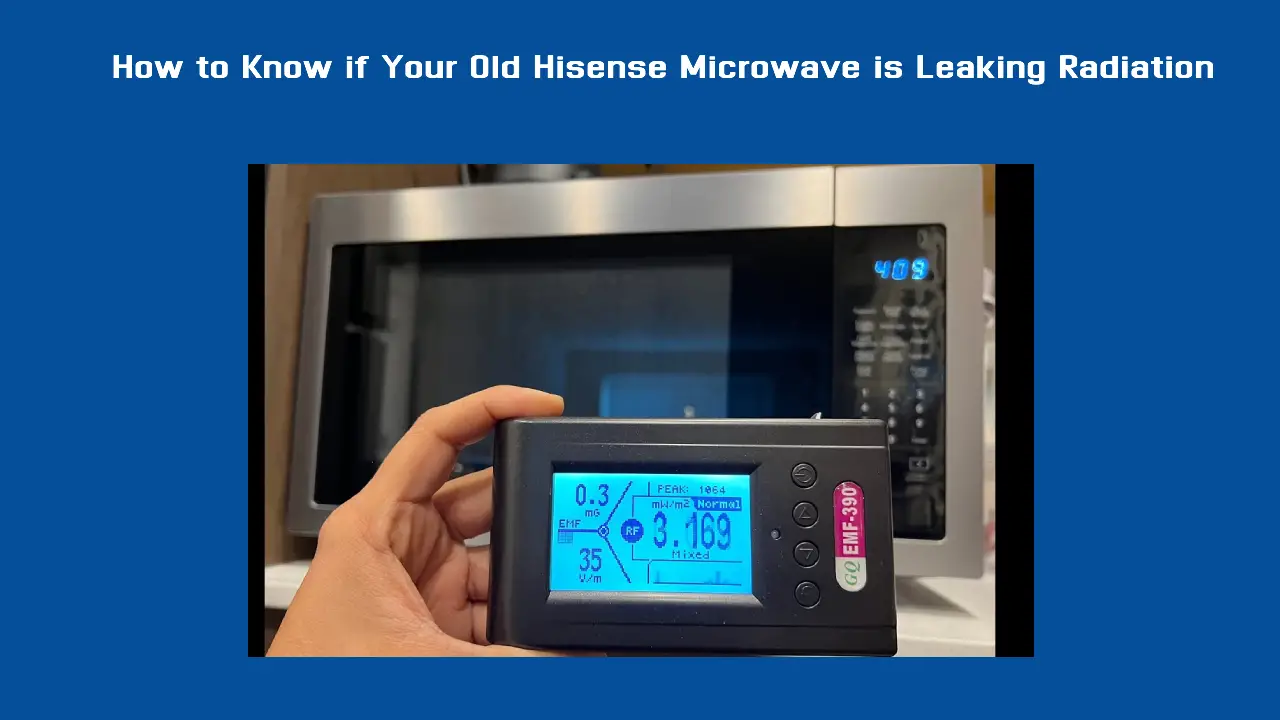It is true that microwaves do lots of good services in our homes; they help cook our food, redhead our meals within a short period and save a lot of money on electricity.
But as with all electronic devices, they can start functioning in a way that can cause desersterto our health, which no one wants in any way.
If you understand how the microwave works, you will know that it uses radiation to heat our food; with the power of the megatonne that is found in our microwave electronic component, our food can be heated and reheated within a short period of time.
Now when this radiation starts leaking; it can cause lots of health issues that may take lots of money to be healthy, so knowing when your old microwave radiation is leaking is very important, and that is what we will be talking about in this very guide.
What You Should Understand About Microwave Radiation?
Microwave ovens cook food using electromagnetic radiation. This radiation is tuned to a frequency that excites water molecules, heating your food efficiently. While this method is generally safe and regulated, improper maintenance or aging components can lead to leakage.
The term “microwave radiation” might evoke a sense of concern, but it’s very important that you distinguish it from the ionizing radiation associated with nuclear reactors and medical X-rays. Microwave radiation is non-ionizing, meaning it does not have the same cellular damaging properties as its high-energy counterparts.
Nevertheless, consistent exposure to even non-ionizing radiation can pose health risks if it escapes containment, prompting the need for vigilant monitoring.
Signs That Your Microwave May Be Leaking Radiation
Recognizing the early signs of a leaking microwave can save you from potential health risks. Here are some indicators that your microwave is not operating as securely as it should:
- Inconsistent Cooking: If your food is unevenly cooked or takes longer to heat, it could suggest that the microwave’s shielding is compromised.
- Unusual Sounds or Smells: Any out-of-the-ordinary noises or burning smells are immediate red flags that a technician should address.
- Physical Damage: Dents or warping around the door seal can prevent it from closing properly, a common cause of radiation leaks.
Performing routine checks for these symptoms is crucial, as early detection can prevent larger issues.
How You Can Test If There Are Radiation Leakage
Testing for radiation leakage in your microwave might sound like a task for professionals, but there are simple methods you can employ at home to assess your appliance’s safety. One popular method involves using a standard fluorescent light bulb:
- Turn off all lights in the room: Ensure that the microwave operates in as much darkness as possible.
- Place the bulb around the microwave door: While the microwave runs (with a cup of water inside for safety), move the bulb along the edges of the door. Watch for any unusual glowing from the bulb—a sign that microwaves are escaping.
- Use a microwave leakage detector: Consider purchasing one for a more precise test. These devices provide a more accurate reading of radiation levels around your microwave.
Always prioritize safety when conducting these tests. If you suspect your microwave is leaking radiation, refrain from using it until a professional can assess it.
How You Can Prevent Microwave Radiation Leaks
Maintaining your microwave in optimal condition is a task and a responsibility you should take seriously. Regular inspections, the cornerstone of microwave safety, are the best way to prevent leaks and ensure your appliance remains safe and efficient.
- Regular Inspections: Check the door seal and hinges regularly for any signs of damage. Even minor imperfections can lead to significant radiation leakage.
- Clean Regularly: Ensure the interior is clean from food splatters, as built-up grime can eventually damage the microwave’s interior, affecting its functionality.
- Avoid Slamming the Door: Treat your microwave door gently. Slamming can cause misalignment, leading to gaps through which radiation can escape.
Implementing these simple habits can significantly extend the life of your microwave and reduce the likelihood of radiation leaks.
When You Should Consider Replacing Your Hisense Microwave
Microwaves are not designed to last forever. The average lifespan of a microwave oven is between 7 and 10 years, depending on the frequency of use and maintenance. Here are a few signs that it might be time to replace your old Hisense microwave:
- Frequent Repairs: If your microwave requires repeated repairs, especially for critical components, replacing it might be more cost-effective.
- Technological Advancements: Newer models often come with improved safety features and energy efficiencies that older models lack. Embracing these advancements can enhance your kitchen’s safety and functionality, providing peace of mind with modern safety features. Performance Issues: If your microwave struggles to heat food evenly or takes longer than usual, it could indicate a decline in efficiency and safety.
Replacing an old microwave with a new model can enhance your kitchen’s safety and functionality, providing peace of mind with modern safety features.
Conclusion
Regular maintenance and awareness are not just your first defence against microwave radiation leaks, but also your empowerment.
By understanding the signs of a potential leak and knowing how to test for them, you can ensure that your Hisense microwave continues to be a safe, efficient part of your kitchen arsenal. Remember, while microwave ovens are generally safe, no appliance is foolproof.
Stay proactive about your microwave’s condition, and don’t hesitate to consult a professional if you suspect any issues.
Their expertise can provide reassurance and ensure your microwave is in top condition. A well-maintained microwave cooks more effectively and minimizes any health risks of radiation exposure.
Lastly, consider upgrading to a newer model if your current microwave shows its age—modern technological advancements are worth the investment for functionality and safety.
